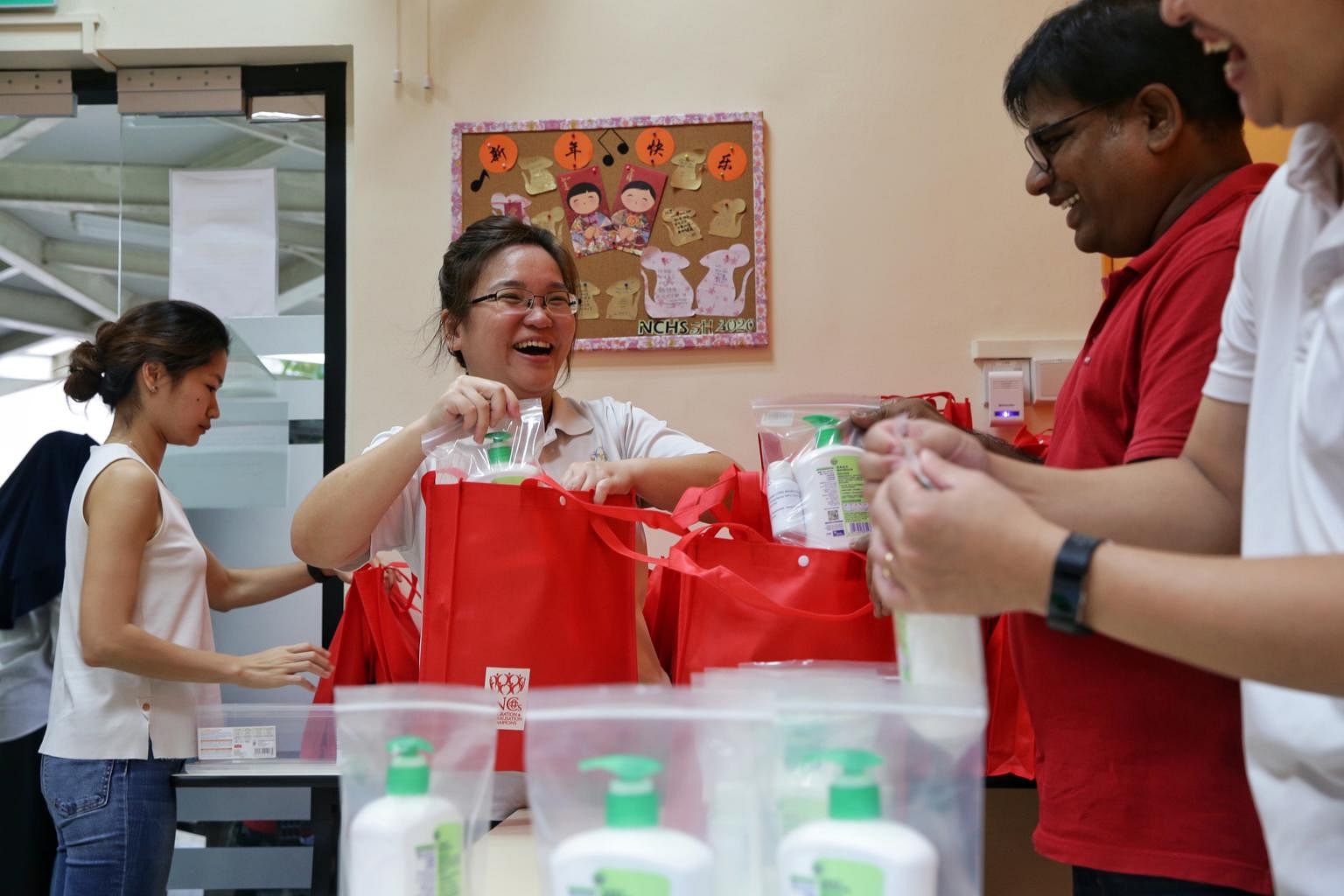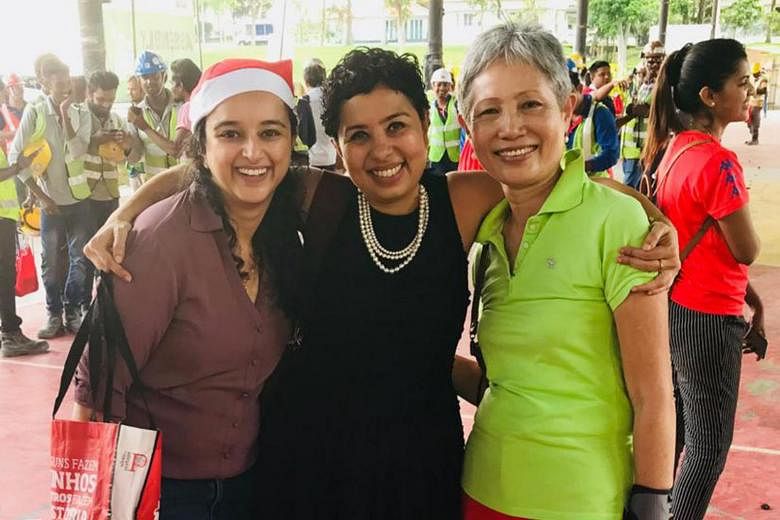SINGAPORE - Ms Ruchi Trivedi, 35, has been busy managing teams of volunteers in organising the delivery of care packages, hot meals and phone data cards to foreign workers hit hard by the coronavirus.
For the past three years, she has been a full-time volunteer at ItsRainingRaincoats, a ground-up initiative that serves migrant workers.
At the end of 2016, she and her husband, both Indian citizens, moved to Singapore from the United States, on account of his job in the pharmaceutical industry.
After studying and working in Texas and California for six years - she took a master's degree in engineering management and worked in the product management sector - the migrant worker cause resonated with her.
"I was looking for a purpose I could identify with. I had moved abroad to study and work. When you leave your family and friends, it's emotionally hard to navigate a new world by yourself," says Ms Trivedi, an engineer by training.
While she was in the US, she missed having the support of family and friends to share the challenges and achievements of her job search and career.
She also missed being with loved ones during festivals and weddings back home in Mumbai.
Many recent immigrants and new citizens have stepped up to help out during Covid-19, such as by distributing masks to vulnerable Singaporeans and supplies to foreign workers.
Whether motivated by empathy as a fellow migrant, or through a desire to help the wider community in a crisis, observers say volunteerism is one way that immigrants can bond more deeply with their adopted country.
Some of these migrants acquired Singapore citizenship in recent times, years after raising children or establishing careers here.
Associate Professor Elaine Ho, from the department of geography at National University of Singapore (NUS), says: "Immigrants may see volunteering as a way of anchoring themselves and helping themselves to understand the norms of the community, as well as give back to the society."
Sociologist Laavanya Kathiravelu, an assistant professor from Nanyang Technological University (NTU), notes that foreigners not complying with circuit breaker regulations have been the focus of attention recently.
She says: "Divisions between locals and foreigners were reflected in the Robertson Quay incident, for example, but people - immigrants and Singaporeans - are actually coming together, despite such differences, to help in any way they can."
Some non-Singaporeans were investigated by the police after photos of crowds in Robertson Quay circulated on social media earlier this month, despite the circuit breaker.
The photos, which drew backlash online, showed people failing to stay at least 1m from one another. Many were not wearing masks.
Netizens noted that the riverside dining enclave tends to draw expatriates, suggesting there might be "double standards" at play.
Dr Kathiravelu notes that while cultural or linguistic affinities with foreign workers may prompt some immigrants to help out, volunteerism during Covid-19 typically cuts across class and national lines.
Retired lecturer Christine Pelly, 64, volunteers to do translation work with non-profit organisation TWC2 (Transient Workers Count Too), which promotes equitable treatment for migrant workers in Singapore.

A former Malaysian who moved here in the late 1980s, she became a Singapore citizen in 2011.
She recounts a phone conversation she had with a foreign worker who was recovering from Covid-19. He was "more chirpy" than usual because a doctor who spoke Tamil had attended to him, says Ms Pelly, who is sometimes called Amma (mother) or Akka (elder sister) by the Tamil-speaking workers she encounters.
"What links us is the language we speak but it's our shared sense of humanity that motivates me, seeing these workers in need," says Ms Pelly, who is married to a 72-year-old retired academic.
The couple have two daughters and two grandchildren.
Some groups supporting migrant workers, like TWC2, have seen rocketing interest.
This month, about 60 people indicated they would like to attend an introductory session for volunteers at TWC2, double the usual number.
Volunteer numbers at ItsRainingRaincoats have doubled in recent months from 250 to 500 volunteers.
NUS' Dr Ho notes that while immigrant associations and grassroots organisations are conventional platforms for migrants to get involved in a society they are new to, volunteerism during Covid-19 also seems "more diffused and differentiated", such as through student initiatives and ad hoc volunteer projects.
Members of Bengali Association Singapore have been asked by government and hospital representatives to translate advisories and other messages for Bengali-speaking foreign workers from Bangladesh.
Jiangsu Association (Singapore)'s contributions include a donation of about $58,000 to #Engage, an initiative by The RICE Company to engage vulnerable children in online arts and lifestyle activities during the circuit breaker.
Kowloon Club, whose members come from Hong Kong, is donating 300,000 face masks to various Singaporean groups.
A spokesman for the People's Association (PA) says many volunteers from grassroots organisations, who spearhead naturalisation programmes, as well as volunteers from immigrant associations, took part in activities like temperature-screening and ensuring social distancing at community clubs, during the distribution of hand sanitisers and face masks.
One such volunteer, 56-year-old housewife Lan Eoi Nah, became a Singapore citizen in June last year, years after her husband, also a former Malaysian, and three children became citizens.

With 20 years of grassroots volunteering under her belt, she is paying it forward as one of the PA's Integration and Naturalisation Champions, who work with immigrants and locals to promote integration in the community.
In fact, she has made volunteering a family affair.
Her adult children have all helped out at past grassroots events, with her only daughter, who is 19, teaming up with her to take temperatures before the circuit breaker at Chua Chu Kang Community Club.
FAMILY IS TOP REASON FOR TAKING UP CITIZENSHIP
Mr Ramalingam Vaithiyanathan, 43, took close to 20 years to become a Singapore citizen.
He moved to Singapore on a job transfer in 2000 and became a permanent resident five years later. He and his 36-year-old spouse, housewife Ramalingam Sasikala, are from Tamil Nadu in India.

Mr Vaithiyanathan, a director at a company that focuses on industrial automation and digitalisation, says: "I was waiting for my children to grow up. I wanted to involve them in the discussion of whether to take up citizenship."
Although his daughter Posshika, 15, and his son Sorissh, 11, were born in India, they have been raised here since they were about two months old.
The family of four became Singapore citizens in 2018.
Mr Vaithiyanathan, who has been distributing face masks at Hwi Yoh Community Centre in Serangoon North, is among the new citizens who see volunteering as a way to promote integration in the community. Designated by the People's Association as one of its Integration and Naturalisation Champions, he has been volunteering for the past 12 years.
Though he has long felt settled in Singapore, his experience shows that taking the step to become a citizen can be years in the making.
Family ties are often the main factor in the decision, those who became citizens in recent years told The Sunday Times.
For sales manager April Lau, 42, considerations of her family in Malacca helped clinch her decision to become a citizen in 2016.
Ms Lau, who is single, came here to work more than 20 years ago and lived in her uncle's home then.

By living frugally, she managed to buy a home for her parents in Malacca when she was 21, with a RM15,000 down payment.
"I did not know if my siblings would eventually work abroad. If so, I would have to return to take care of my parents," says Ms Lau, who became a permanent resident about 12 years ago.
Her younger brother eventually moved here to live with her.
Her elder brother and younger sister, who live in Malaysia, said they would provide a home for their parents if needed, which gave her the peace of mind to apply for citizenship here.
As a grassroots leader in the Sengkang West Integration and Naturalisation Committee, she and her team, which includes new citizens, have given care packages to elderly residents and cleaners.
Recalling how a friend had asked her to join him in volunteering four years ago, she says: "I meet Sengkang West new citizens who have the same thinking I used to have. They want to volunteer but nobody has pulled them in.
"I tell myself that I need to play that role."












